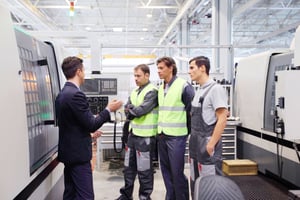 Few businesses wants to hire a CPA who knows little about their industry. This is especially true in manufacturing, where intricate processes and procedures take time to understand. CPAs with sound industry experience had to overcome a host of challenges and develop true technical knowledge of manufacturing operations to be effective.
Few businesses wants to hire a CPA who knows little about their industry. This is especially true in manufacturing, where intricate processes and procedures take time to understand. CPAs with sound industry experience had to overcome a host of challenges and develop true technical knowledge of manufacturing operations to be effective.
Here's what you should know to best support your manufacturing clients and ensure valuable R&D tax credits don’t go unclaimed.
Manufacturing Processes
One of the most important things manufacturing CPAs need to learn is how individual manufacturing processes work in real life. From design activities to final packaging, it's crucial that CPAs fully understand daily operations from a practical perspective.
Here are just a few of the processes manufacturing CPAs need to be versed in:
- New product design process
- Quoting processes
- Flat blank layout designs
- Tool design and building processes
- Prototyping and modeling
- Proof of concept processes
- Production line set-up
- Trial production run procedures
- Quality approval processes
- Custom packaging design
Understanding the intricacies of these processes will allow CPAs to assist in developing fundamental financial strategies for their manufacturing clients. Knowledge of these activities can also help manufacturing CPAs identify ways to help identify all qualified R&D tax credits when working with an R&D tax credit specialist.
Check out the video below as Dan Digre of MISCO Speakers discusses the importance of industry knowledge in relation to the R&D tax credit specifically.
Products, Parts, and Materials
A manufacturing CPA should be able to answer basic questions such as: What do we make, and what is it made from? But a deeper understanding of a company's final products and the parts and raw materials used to make those products will yield significantly better financial outcomes.
Suppose a manufacturer is considering using a new adhesive that provides better durability but comes at a higher cost. A CPA who's involved in this decision making could run the numbers and forecast the projected ROI for using that new material. If they know how that adhesive is applied, and understand the processes already in place, they could also predict if using the new material would slow down operations.
While it may seem overly ambitious to expect a CPA to develop this detailed level of knowledge about manufacturing materials, it's exactly this kind of expertise that will lead to the best financial returns.
Personnel Time and Energy
Along with understanding how materials are being used in the manufacturing processes, CPAs also need to know who is actually performing those activities. That's because most of the expenses that qualify for R&D tax credits center around the actions performed by these employees.
Wages are one of the biggest expenses for which companies can claim tax credits, but they can only do so if a CPA is able to determine exactly how much of an employee's time is spent on qualifying activities. By examining workflows, staffing structure, and even timesheets, CPAs can leverage employee efforts for the best R&D tax credits available.
Knowledge is Power
The simple truth is that anyone who wants to be more successful in their job needs knowledge. For CPAs, being equipped with solid manufacturing fundamentals allows them to identify opportunities for increased efficiency, spot potential savings, and find more ways to secure valuable R&D tax credits.
Does my Client Qualify?
Manufacturers develop/improve parts and products either for themselves or for their clients. In the course of doing so, they also develop and improve processes. Therefore, every manufacturer by definition, is doing R&D and may potentially qualify for the credit.
If your client is $5M or more in annual revenue, has 25 or more employees and is profitable (5-25-P), there’s a good chance an R&D tax credit study will yield a solid ROI. Most companies then choose to reinvest the tax savings back into the business to be more competitive, grow faster and be more profitable.






